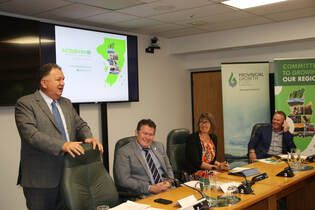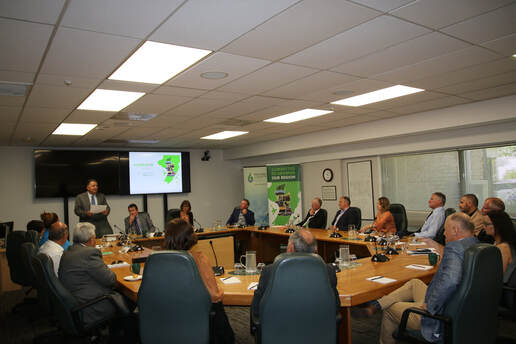|
In addition to announcing $380,000 PGF funding towards research for New Zealand’s first bio-forestry initiative, and $120,000 towards the Tutaenui Community Agricultural Water Scheme, Minister Jones announced $200,000 will be given to Accelerate25 to refresh the Manawatū-Whanganui Economic Action Plan.
|
“In addition to increased economic growth, regional iwi, business and local government leaders have collaborated over significant priorities – championing these with central government to seek support and funding,” says Mr McCartney.
“While we have seen success in some of our initial areas of focus, over the past three years new opportunities have arisen.
“Today’s PGF funding is timely as a refresh will enable us to focus on where are future efforts are best spent.
Accelerate25 programme director Craig Nash says one of the new initiatives recognised by the PGF is bio-forestry – a world-leading technology that will create biodegradable, compostable and renewable products from under-utilised forestry resources.
“This alternative to petroleum-based plastic products will be a New Zealand first, and has been supported by the PGF with $380,000 to research commercial production of bio plastics in the Horizons Region,” says Mr Nash.
“A regional alliance comprising iwi, local and central government, technology development partners, and commercial investors are working with NZ Bio Forestry Ltd to progress a pilot plant by early 2022.”
Shelley Dew-Hopkins, lead of the region’s Primary Sector Group, says funding towards hill country stock water reticulation in the Rangitīkei District opens up opportunities for the farmers involved.
“A national study, involving 11 case study farmers who had been running systems for at least 18 months revealed farmers on average experienced an Internal Rate of Return of 53 per cent,” says Mrs Dew-Hopkins.
“While the impact on the bottom line is a primary focus, uptake of stock water reticulation in the Manawatū-Whanganui Region will allow for better environment management and animal welfare, including lessening the impact of drought and keeping stock out of waterways.”
In addition to central government’s $120,000, the water reticulation project is being supported by a further $60,000 from Rangitīkei District Council, and $10,000 from Horizons Regional Council.
While in Palmerston North, Minister Jones also received an update on KiwiRail’s Regional Freight Hub which received $40 million from the PGF last year.
“Our region is well placed, with three major ports to the east, west and south, the main rail trunk line, and New Zealand’s main state highway leading through it. Coupled with twice daily jet air freight services makes the Regional Freight Hub the only place in New Zealand to enjoy a truly inter-modal network” says Mr Smith.
“This world class facility will improve freight efficiency and connectivity while supporting the management of the country’s growing freight volumes. At the same time it will reduce transport emission as each tonne of rail freight has 66 per cent fewer carbon emissions compared to road.
“The regional freight hub builds on Accessing Central New Zealand, a subgroup of Accelerate25, focused on improved integrated multimodal air, road, and rail networks to accelerate exporting from our region to domestic and international markets”.
“Under Accessing Central New Zealand, the region has also been successful in progressing a Regional Freight Ring Road around Palmerston North City, which aligned with the Regional Freight Hub, is an integral part of helping our region prosper.”
ENDS
For further information, please contact Chrissie Morrison, Media and Communications Manager, Horizons Regional Council, on chrissie.morrison@horizons.govt.nz, 027 695 9747.

